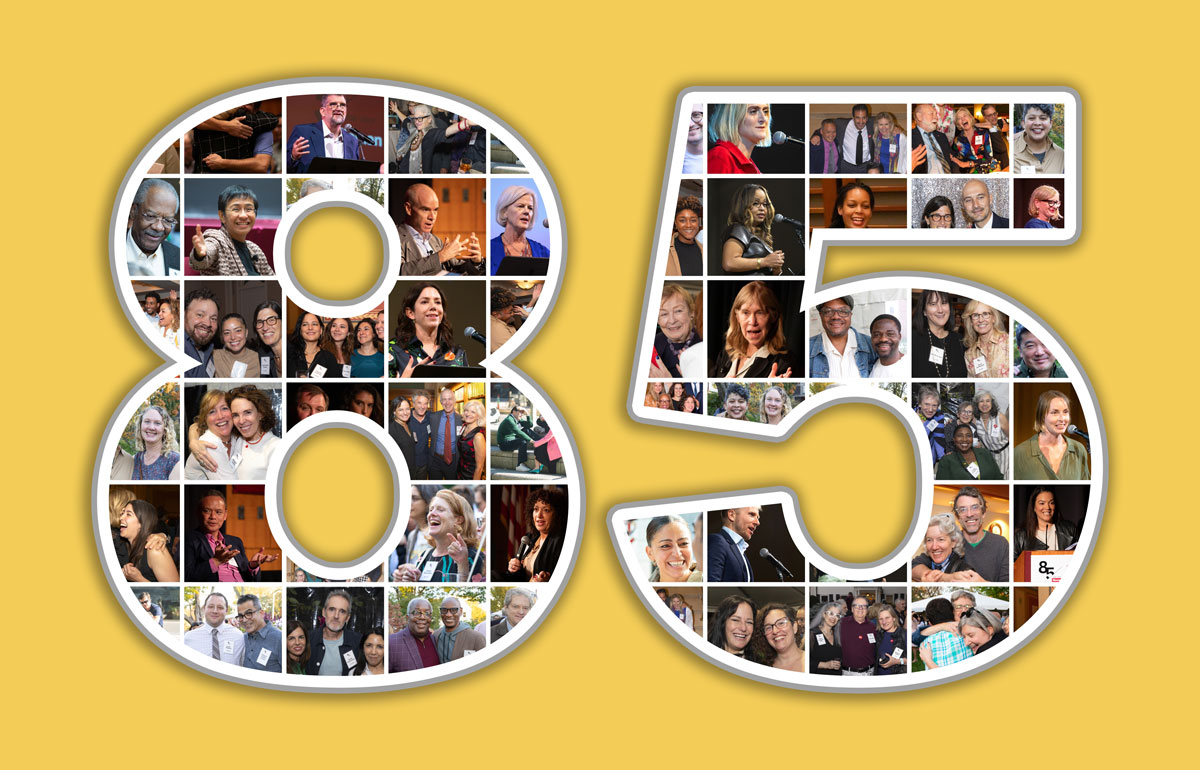85 Years of Fellowship
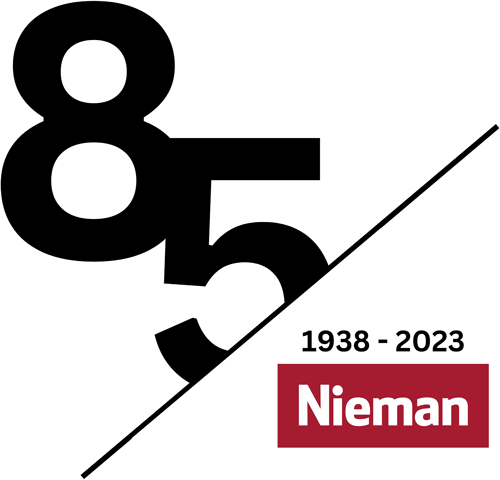
The Nieman Foundation celebrated its 85th anniversary in 2023 with an inspiring and thought-provoking reunion weekend at the end of October. More than 400 guests from 40 countries representing seven decades of Nieman Fellowships attended. The event provided alumni with an opportunity to reconnect with classmates and make new connections, hear from leading Harvard professors and learn how newsroom leaders are coping with daunting new challenges. The weekend also offered time and space for the Nieman community to reflect on journalism’s progress since Nieman’s founding in 1938, and to contemplate its rapidly evolving future.
Highlights included:
- An evening of captivating storytelling with Nieman alumni, each sharing “the story I couldn’t let go”
- The 90-Minute Nieman, a series of talks by Harvard faculty experts who spoke about subjects ranging from the rapid growth of AI and the climate crisis to global health inequities and racism, as well as polarization and other threats to democracy
- Insightful discussions with New York Times executive editor Joseph Kahn, who talked with Henry Chu, NF ’15, deputy news editor at the Los Angeles Times, about striving for greater reporter diversity, the formidable challenges of covering war and the implications of AI for newsrooms, among other topics; and Nobel Peace Prize laureate Maria Ressa, CEO of the online news publication Rappler in the Philippines, who spoke with Nieman curator Ann Marie Lipinski about her advocacy for press freedom and fighting against the dangers of disinformation and weaponized social media
- A panel with Nieman alumni, all with deep experience reporting on the Middle East, about the difficulties of covering the Israel-Hamas war and the terrible toll the fighting has taken on journalists covering the region
- Alumni gatherings at Lippmann House and a dinner at the Boston Public Library
Watch videos of the reunion talks and view our photo galleries.
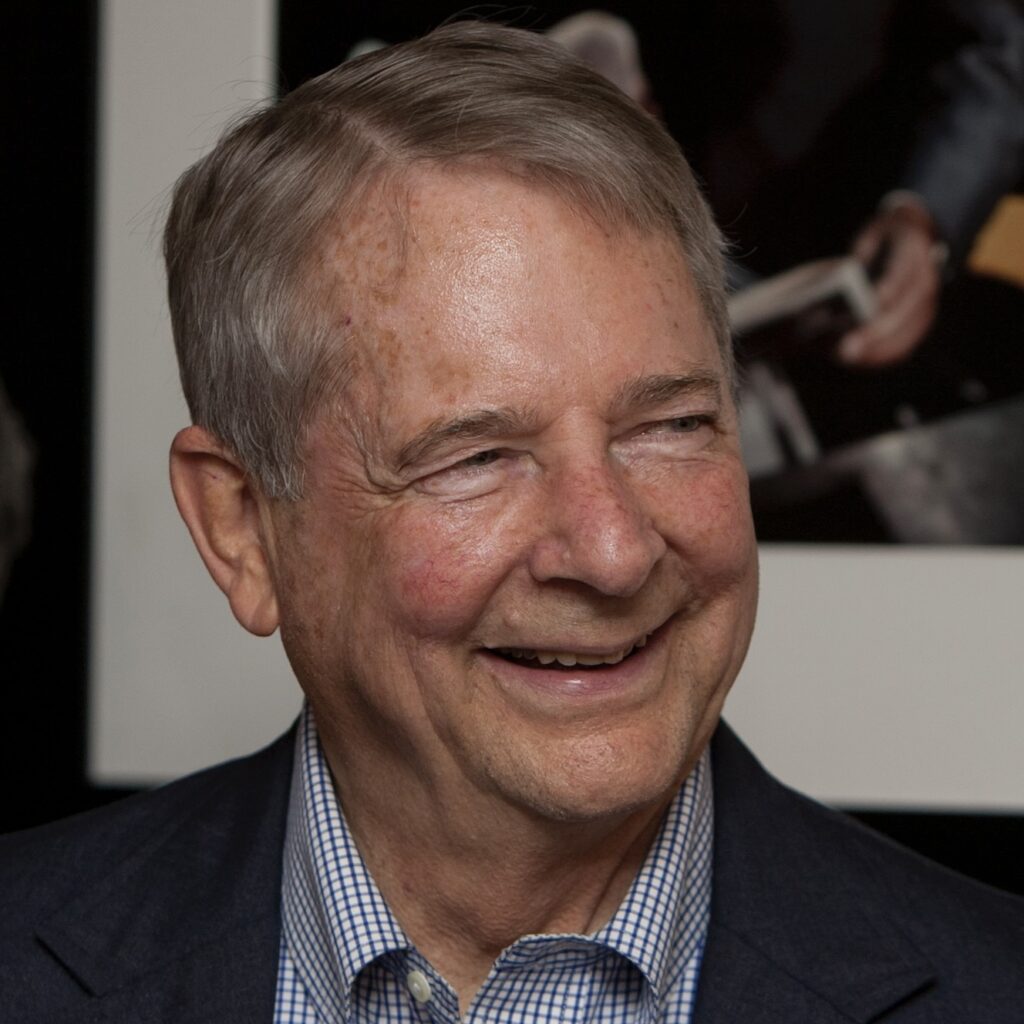
Nieman alumni Martha Bebinger, NF ’10, and Alfredo Corchado, NF ’09, paid tribute to the life and work of former Nieman curator Bob Giles, who passed away on August 7, 2023, at the age of 90. During his 11 years as curator, Giles oversaw the launch of the Nieman Journalism Lab and Nieman Storyboard. Also under his leadership, the annual Christopher J. Georges Conference on College Journalism began and several national Nieman-based journalism awards were created, including the Taylor Family Award for Fairness in Journalism and the I.F. Stone Medal for Journalistic Independence. He additionally brought the Worth Bingham Prize for Investigative Journalism to Nieman and oversaw the expansion of Walter Lippmann House, Nieman’s home on Harvard’s campus. During his tenure from 2000-2011, Giles selected several hundred journalists from around the world to study as Nieman Fellows.
Conference Collaboration
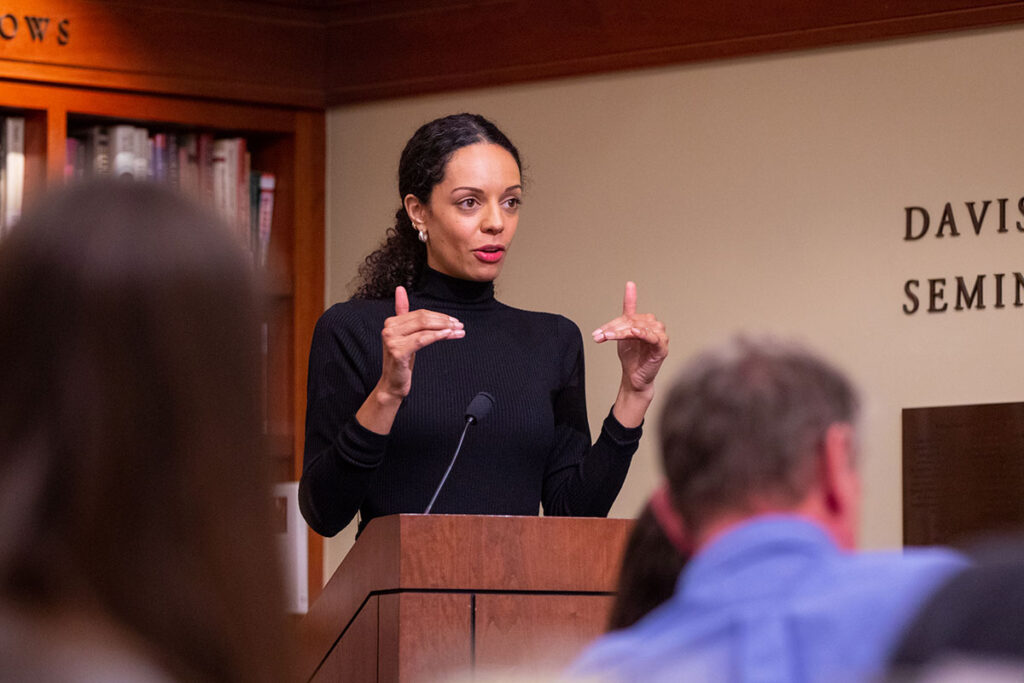
At the end of March, the Nieman staff welcomed students to the 2023 Christopher J. Georges Conference on College Journalism, the first Georges event to be held in person since the start of the COVID-19 pandemic. Caitlin Dickerson, an investigative reporter and feature writer for The Atlantic, opened the weekend with a keynote address about her extensive coverage of immigration issues. In an earlier seminar, she spoke to Nieman Fellows about how she produced her “Secret History of Family Separation” investigation for The Atlantic about the Trump administration’s Zero Tolerance border policy that separated over 5,000 immigrant children from their families. Ruth Tam, a digital editor at WAMU and a 2023 Nieman, moderated the discussion.
Videos of other Georges Conference sessions are available online, including a presentation by Dr. Katherine Porterfield on trauma-informed journalism; tips on the art of the interview with 2023 Nieman Fellows Angie Drobnic Holan, editor-in-chief of PolitiFact, Romy Neumark, a senior anchor at Kan, the Israeli Public Broadcasting Corporation, and Natasha Khan, a Hong Kong-based Asia correspondent for The Wall Street Journal; and a lightning round with student journalists.
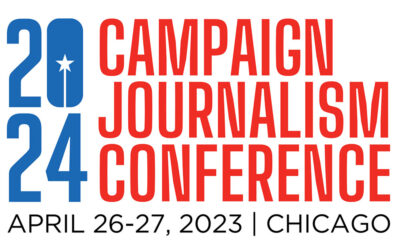
In April, Nieman partnered with the University of Chicago Institute of Politics to host the 2024 Campaign Journalism Conference. Over two days, participants heard from leading political journalists, analysts and election officials about topics ranging from content verification and campaign finance tracking to changes in election laws and the role the press can play in preserving democracy in the lead up to the 2024 congressional and presidential elections in the U.S.

Also in April, at the 2023 International Symposium on Online Journalism in Austin, six Nieman Fellows in the class of 2023 spoke about the state of the news media in their home countries, providing a sobering look that earned a standing ovation from the journalists in the audience. The annual conference is organized by Rosental Alves, NF ’88, founder of the Knight Center for Journalism in the Americas at the University of Texas at Austin.
Panelists included 2023 Nieman Fellows Fahim Abed, a former reporter for The New York Times in Afghanistan; Adefemi Akinsanya, correspondent and anchor at Arise News in Nigeria; Sheikh Sabiha Alam, a senior reporter at Prothom Alo in Bangladesh; Pinar Ersoy, Istanbul editor for BBC Monitoring in Turkey; Bopha Phorn, an independent journalist from Cambodia; and Taras Prokopyshyn, publisher of The Ukrainians Media in Ukraine. Also joining the group was José Zamora of Exile Content Studio, whose father, José Rubén Zamora, founder of elPeriódico, is jailed in Guatemala. Nieman Foundation curator Ann Marie Lipinski moderated the discussion.
In a separate ISOJ discussion about journalism in exile, 2023 Nieman Fellows Danny Fenster, editor-at-large for Frontier Myanmar, and Olga Churakova, an independent Russian journalist and host of the podcast, “Hi, You’re a Foreign Agent,” discussed how journalists forced out of their countries use technology to report from abroad and have impact back home.
In addition, 2023 fellow Darryl Fears, an environmental justice reporter at The Washington Post, spoke on a panel examining how to improve coverage of the climate crisis and Santiago Lyon, NF ’04, the head of advocacy and education for the Content Authenticity Initiative, ran a workshop on combating photographic mis/disinformation.
Staff News
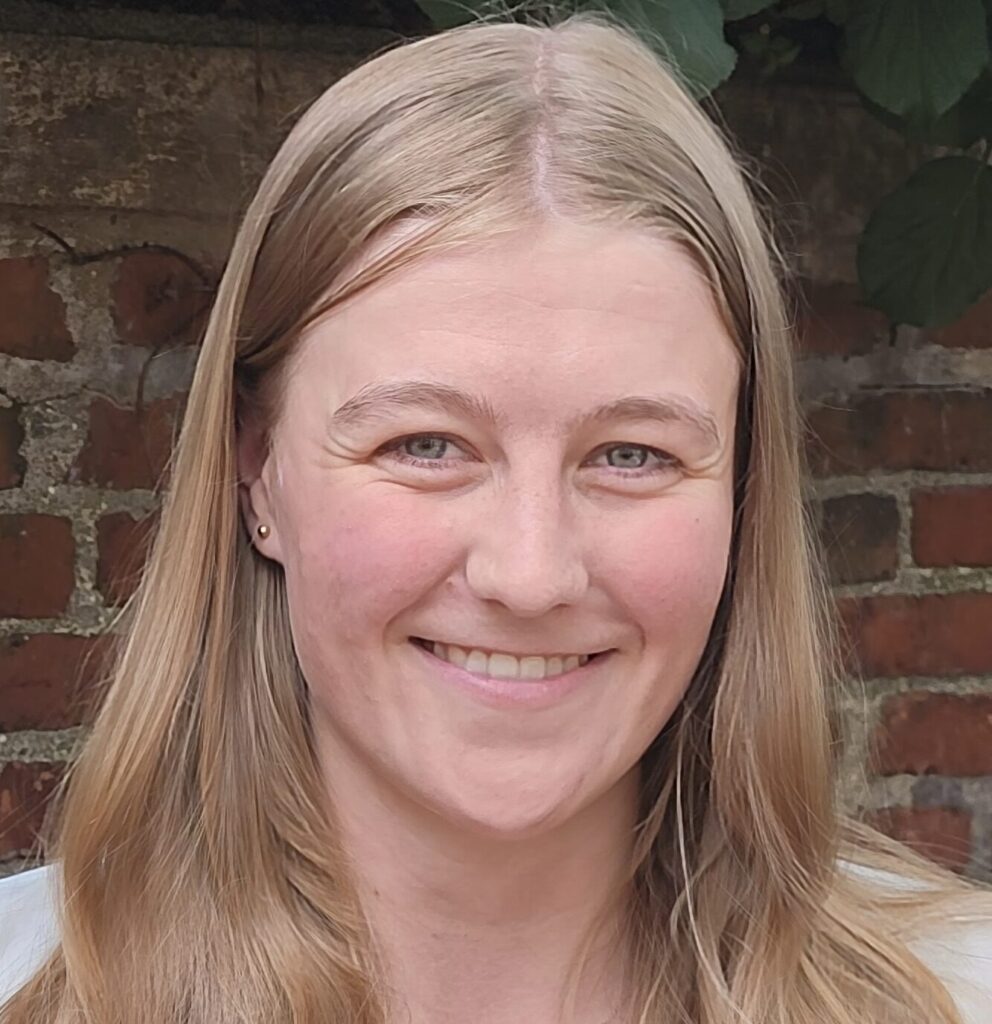 |
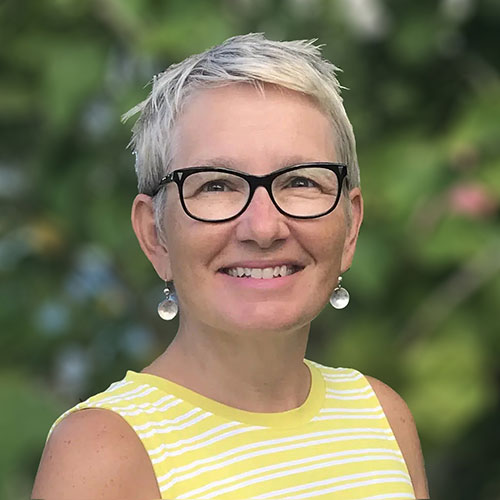 |
 |
In September, Nieman Lab announced it was expanding and adding two new staff writers to focus on stories about what’s happening to local news coverage in the U.S and the explosion of content produced by generative artificial intelligence. Sophie Culpepper, who had been hired as a Lab staff writer in April, made the switch to take on the local news reporting job, opening her spot for another staff reporter. Culpepper joined the Lab from the hyperlocal Massachusetts news site The Lexington Observer.
Also in 2023, Adriana Lacy, who worked as Nieman’s digital and audience engagement editor since joining the foundation in 2021, moved to part time and Barbara McCarthy, Nieman’s previous web communications specialist, returned to Nieman, also in a part-time position, to manage web and other digital projects.
Nieman Updates
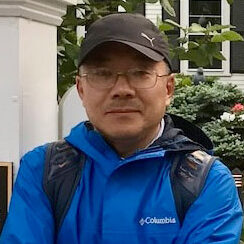
As Nieman continued its focus on journalists in danger and efforts to silence them, the situation of 2007 Nieman Fellow Dong Yuyu raised an alarm. Dong, an editor and columnist at the Chinese Communist Party newspaper Guangming Daily known for his pro-reform writing, was detained in Beijing and charged with espionage. His Nieman friends and other colleagues expressed concern about his treatment in an open letter signed by Nieman curator Ann Marie Lipinski and more than 60 others in April. The Washington Post, The New York Times, The Wall Street Journal and other news outlets reported on his case and the Post published an editorial: “A Chinese journalist is charged with espionage. But journalism is not spying.”
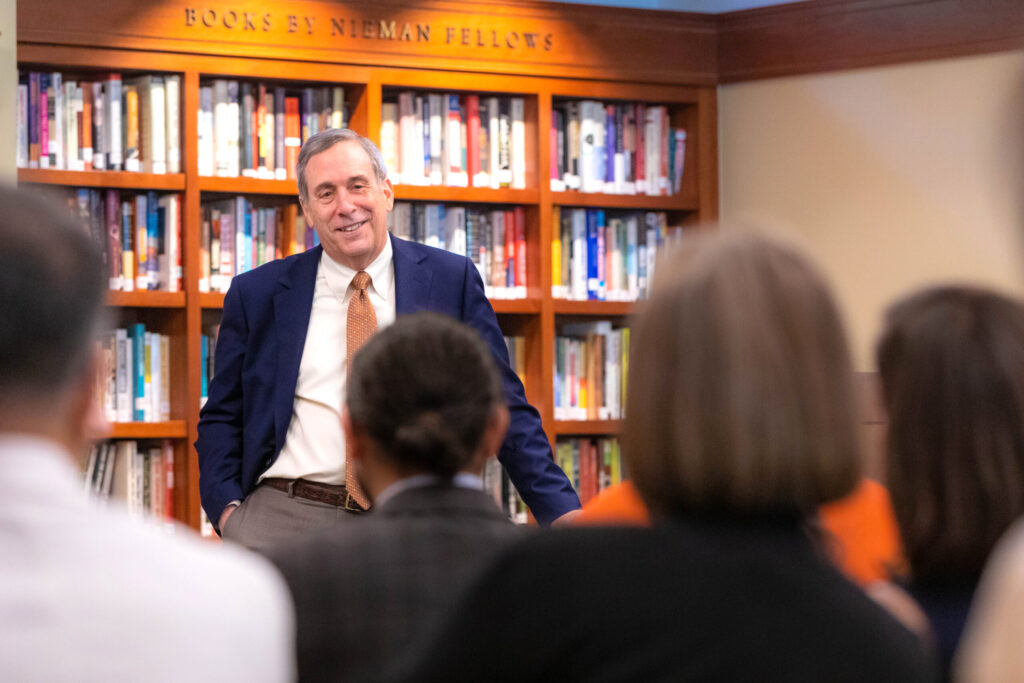
In May, the class of 2023 welcomed Harvard President Lawrence Bacow to Lippmann House for the last time ahead of his retirement. The foundation is deeply grateful for his support of Nieman and of the free press and for all he accomplished during his tenure, including keeping the university running smoothly during the pandemic.
Bacow’s successor, Claudine Gay, started her new role on July 1 and was inaugurated as the university’s 30th president on September 29. Learn more about her and her Harvard journey from a Ph.D. student to the university’s top leader.
Nieman is administering a new fellowship funded by Schmidt Futures that provides journalists with China expertise the chance to sharpen their skills and enhance their coverage of China and U.S.-China policy issues. Selected reporters will spend two semesters at Harvard followed by a nine-month reporting fellowship with The Associated Press. Elsie Chen, a Chinese journalist based in Shenzhen, China, who previously worked for The New York Times in Beijing and Seoul, is the first recipient of the specialized fellowship. She is a member of the class of 2024.
As we look ahead to a new year, Nieman remains committed to monitoring and reporting on the issues that matter most to journalists and the media world in our three publications, Nieman Lab, Nieman Reports and Nieman Storyboard.
- Learn more about the many topics we covered in 2023 on our Publications page.
- For more information, follow us on all our social media channels and subscribe to our newsletters.
Nieman’s Journalism Awards

Nieman’s annual journalism awards honor exceptional reporting in several categories. In May, we hosted an awards ceremony that honored not only this year’s winners of the Bingham Prize for Investigative Journalism, the Taylor Family Award for Fairness in Journalism and the I.F. Stone Medal for Journalistic Independence, but all winners of those prizes who couldn’t join us in person during the last few years due to pandemic restrictions. It was an inspirational gathering of reporters doing extraordinary work that exposed and righted serious wrongs and spurred significant reforms in their communities.
We’re grateful to the judges who deliberated to select the winners and finalists of all of our journalism awards, including judges for the Lukas Prize Project awards as well as the 2023 Nieman Fellows, who selected imprisoned Iranian journalists Niloofar Hamedi and Elahe Mohammadi as recipients of the 2023 Louis M. Lyon Award for Conscience and Integrity in Journalism.
Learn more about Nieman’s 2023 journalism award winners on our Journalism Awards page.
In memoriam
We remember members of the Nieman family we lost this year including former Nieman curator Bob Giles, whose achievements we honored at Nieman’s 85th reunion October.

Jerrold L. Schecter, NF ’64, a longtime Time magazine correspondent and author, died at his home in Washington, D.C., on Feb. 6, 2023, at age 90. At Time, he served as a contributing editor and staff correspondent covering China, Southeast Asia and Hong Kong; Time-Life bureau chief in Tokyo; bureau chief in Moscow; and White House correspondent and diplomatic editor. He also served as associate White House press secretary and spokesman for the National Security Council in the late 1970s under President Jimmy Carter. Schecter notably helped in the publication of “Khrushchev Remembers,” the first account by a Soviet leader to reveal the inner workings of the Kremlin.
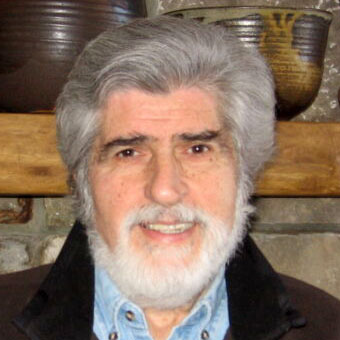
Jerome Aumente, NF ’68, died on February 13, 2023. He was a distinguished professor emeritus in the School of Communication and Information at Rutgers University, where he served as special counselor to the dean. He also was the founding director of SC&I’s Journalism Resources Institute (JRI) and founding chairman of the Department of Journalism and Media Studies. Aumente helped train thousands of journalists around the world and made dozens of trips to Central and Eastern Europe in an effort to strengthen journalism in former Soviet-bloc countries. Under his direction.
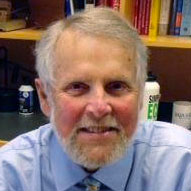
Mike Pride, NF ’85, longtime editor of New Hampshire’s Concord Monitor and mentor to aspiring young journalists, died on April 24, 2023 at the age of 76. He wrote hundreds of columns for the Monitor and national publications, and authored, co-authored or edited eight books. He served as a Pulitzer Prize board member for nine years beginning in 1999 and came out of retirement to serve as administrator of the prizes for three years beginning in 2014.
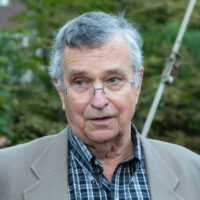
Hodding Carter III, NF ’66, who began his career at his family’s newspaper in Greenville, Mississippi, died on May 11, 2023. He was 88. Carter covered the civil rights movement and racial inequality in the South in the face of boycotts and death threats from white supremacists. He later became U.S. assistant secretary of state for public affairs in Washington and served as chief spokesman during the Iran hostage crisis. He also worked as a broadcast journalist for public affairs shows. He joined the John S. and James L. Knight Foundation as president and CEO in 1998 and significantly increased grants to journalists and news organizations.

Diana Marcum, NF ’18, a former Los Angeles Times reporter, died on August, 9, 2023, in Fresno, California. She was 60 years old. A gifted narrative writer, Marcum won the 2015 Pulitzer Prize for feature writing for “Scenes from California’s Dust Bowl,” a series of articles about the farmers, field-workers and other Californians in the state’s Central Valley. She was the author of “The Tenth Island: Finding Joy, Beauty, and Unexpected Love in the Azores,” and “The Fallen Stones: Chasing Butterflies, Discovering Mayan Secrets, and Looking for Hope Along the Way.”
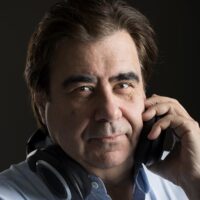
Paul Carvalho, NF ’95, a documentary filmmaker died on August 17, 2023, at his home in Montreal, Canada. He was 72. Carvalho’s documentary projects took him around the world as he chronicled topics ranging from the impact of the 1989 Exxon Valdez oil spill in Alaska and East Timor’s transition to independence to in-depth profiles of notable Canadians. His films focused on historical and biographical topics. Carvalho was best known for “Montréal, mon amour, mon histoire,” a series of five films produced in honor of the city’s 375th anniversary in 2017.
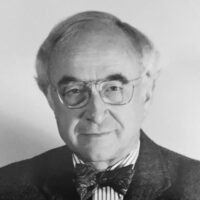
Philip Meyer, NF ’67, died in North Carolina on Nov. 4, 2023, at the age of 93. The father of computer-assisted reporting developed his pioneering ideas while studying social science research techniques and computer science during his Nieman Fellowship. He tested his new methods while covering the 1967 Detroit riots in the summer following his fellowship — reporting that helped the Detroit Free Press win a Pulitzer Prize. Meyer went on to write the landmark “Precision Journalism: A Reporter’s Introduction to Social Science Methods” and teach data-driven journalism around the world.
Nieman Programming
The Nieman Foundation invites a diverse range of speakers to Lippmann House each year to participate in Nieman seminars, shop talks and workshops. Our guests share their research, insights and expertise on a variety of topics and engage in enlightening conversations with the Nieman Fellows and affiliates. Fellows also organize informal gatherings known as DIYs. Fellows in the classes of 2023 and 2024 took turns moderating and hosting many of the talks.
Seminars and Shop Talks
Spring 2023
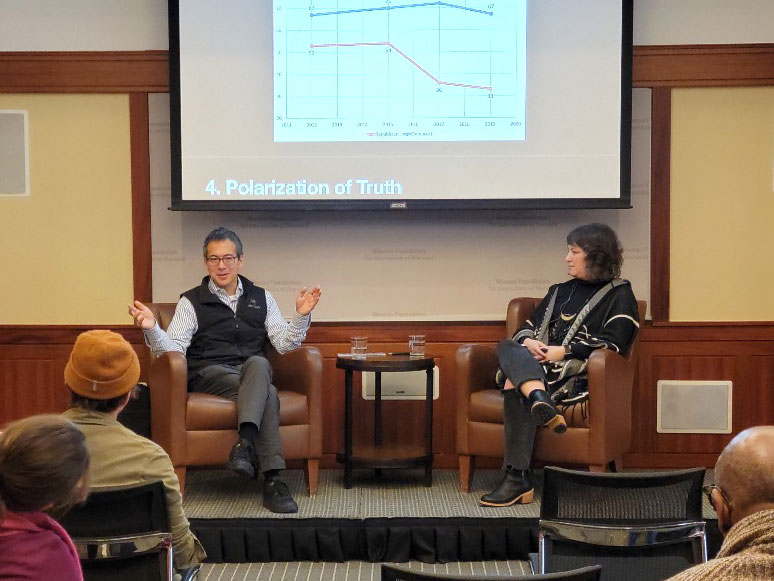
Archon Fung , director of the Ash Center for Democratic Governance and Innovation and the Winthrop Laflin McCormack Professor of Citizenship and Self-Government at Harvard Kennedy School, spoke with 2023 Nieman Fellow Amanda Becker, Washington correspondent for The 19th, about the polarization of truth in society, including the lack of trust in truth-generating institutions like the media, science and higher education.
Ali Asani, Murray A. Albertson Professor of Middle Eastern Studies and Professor of Indo-Muslim and Islamic Religion and Cultures at Harvard, talked with Nieman Fellow Sheikh Sabiha Alam, a senior reporter for the daily Prothom Alo newspaper in Bangladesh, about his work, including research on Islam in South Asia.
Gina Chua, executive editor of the media startup Semafor and former executive editor at Reuters, joined the 2023 Nieman Fellows for a talk on topics ranging from the importance of writing for a global audience and including multiple perspectives when reporting to trans issues and the impact of ChatGPT on journalism. Natasha Khan, Asia correspondent for The Wall Street Journal, moderated the discussion.
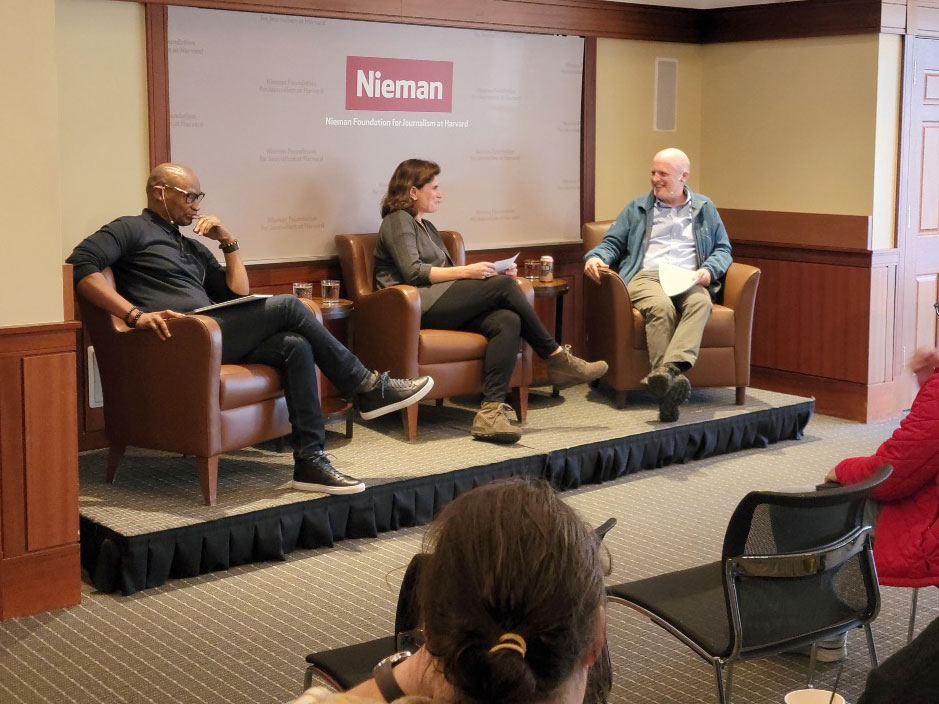
Daniel Schrag, professor of environmental science and engineering, the Sturgis Hooper Professor of Geology and director of the Harvard University Center for the Environment, spoke with Nieman moderators Darryl Fears, who covers environmental justice for The Washington Post, and Elisabeth Goodridge, the deputy travel editor for The New York Times. They discussed the global impact of climate change, the importance of adaptation measures, how the media can adopt more honest messaging about climate issues and the limitations of climate optimism.
Lindsay Hyde, a senior lecturer at Harvard Business School in the Entrepreneurial Management unit, spoke to the fellows about startups, what it takes to launch new ventures and the role of venture capital. Angie Drobnic Holan, editor-in-chief of PolitiFact, moderated.
Ted Benson, founder of Steamship, and Sil Hamilton, a cultural analytics researcher and graduate student in the digital humanities at McGill University, spoke about the latest developments in generative AI — from the unprecedented success of OpenAI versus its competitors, to its potential impacts on journalism — and ChatGPT’s rapid growth.
Fall 2023

Marshall Ganz, the Rita E. Hauser Senior Lecturer in Leadership, Organizing and Civil Society at Harvard Kennedy School joined Nieman curator Ann Marie Lipinski for a discussion about his public narrative work, how to practice leadership, why telling your own story matters and the power of storytelling for social change.
Joan Donovan, professor of journalism and emerging media studies at Boston University and co-author of “Meme Wars: The Untold Story of the Online Battles Upending Democracy in America,” described how misinformation spreads, the methods used by media manipulators to distort information and what journalists can do to identify and counter lies and disinformation. She shared that her guiding mantra is “Truth needs an advocate.”
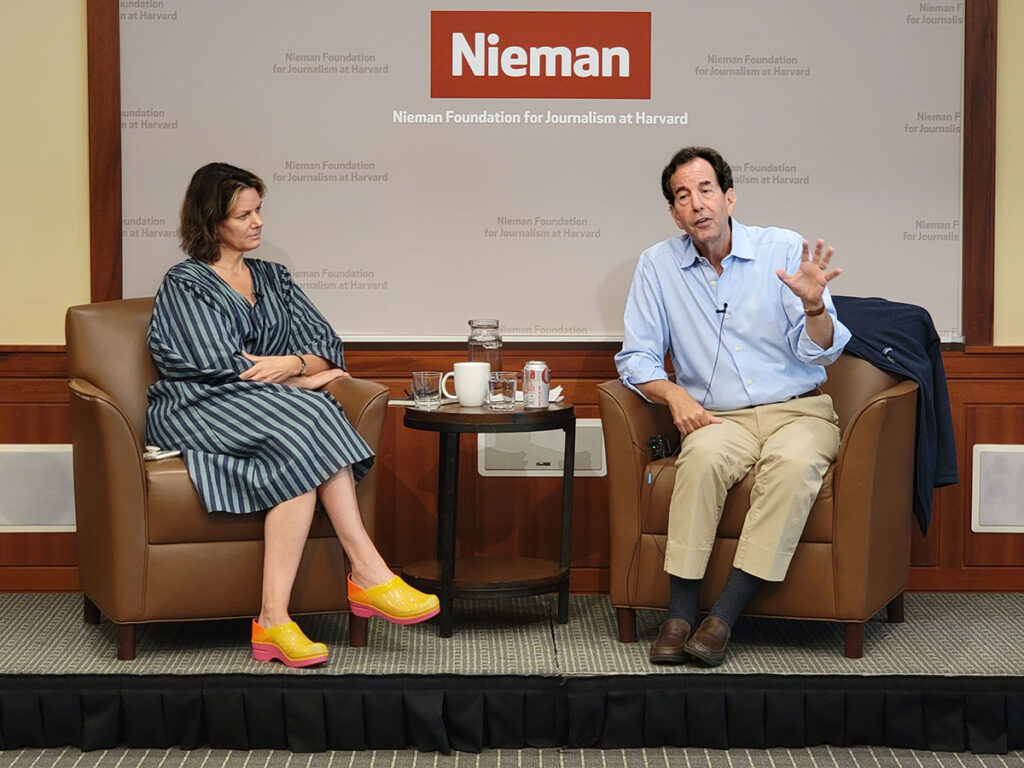
Ronald Heifetz, founder of the Center for Public Leadership and the King Hussein bin Talal Senior Lecturer in Public Leadership at Harvard Kennedy School, joined the Nieman Fellows to discuss building effective team leadership and encouraged them to build strong connections with one another now to create a source of support in the future. 2024 Nieman Fellow Sarah Varney, a senior correspondent for KFF Health News and a special correspondent and commentator for PBS NewsHour, moderated the discussion.
Ravish Kumar, former senior executive editor of NDTV in India and a prominent media personality with than 6.6 million subscribers on YouTube, joined 2024 Nieman Fellow Surabhi Tandon, an Indian video journalist and documentary filmmaker, for a discussion about threats to journalists in their country and the demise of independent newsrooms under Prime Minister Narendra Modi’s Hindu nationalist government. Kumar resigned from NDTV in November 2022, warning that and news consumers were witnessing “the ‘dark age’ of journalism.”

Taylor Lorenz a columnist covering technology and online culture at The Washington Post and a 2019 Visiting Nieman Fellow, talked with Nieman curator Ann Marie Lipinski about her book “Extremely Online: The Untold Story of Fame, Influence, and Power on the Internet.” She spoke about the control that Elon Musk, influencers and others have on the media ecosystem as well as the need for newsrooms to more fully engage with audiences on new platforms. This fall, Nieman Lab’s Hanaa’ Tameez spoke with Lorenz about her book and news publishers’ ongoing adjustment to the internet.
To wrap up the fall semester, Harvard professors Maya Jasanoff and Steven Levitsky spoke with fellows about the climate on campus and external efforts to control free speech.
Nieman DIYs
DIYs, informal talks arranged and hosted by the Nieman Fellows, covered a broad range of topics during the past year.
David Skok, NF ’12, founder, editor-in-chief and CEO of the Canadian news outlet The Logic and a Nieman Advisory Board member, spoke with Nieman Fellow Renée Kaplan, head of digital editorial development at the Financial Times in London, about his work in the digital news sphere as well as tech and innovation in journalism. As a Nieman Fellow in 2012, he co-authored the Nieman Reports story “Breaking News: Mastering the art of disruptive innovation in journalism” with Harvard Business School professor Clayton M. Christensen and Harvard Business School graduate James Allworth.
Kaplan also invited Jacob Weisberg, CEO and co-founder with Malcom Gladwell of the audio production company Pushkin Industries, vice chair of the Committee to Protect Journalists and a member of the PEN America board, to share insights about the media business, startups and the future of journalism. She also spoke with Kevin Delaney, CEO and editor-in-chief of Charter, a company focused on the future of work, about what it takes to start a new media company, various business models and the general climate for digital journalism. Delaney was the founding editor-in-chief and co-CEO of Quartz.
Emily Ramshaw, CEO and co-founder of The 19th, the independent nonprofit newsroom that covers issues related to gender, politics and policy, discussed how and why she helped launch the organization and shared her ideas about nonprofit news entrepreneurship. The talk was moderated by 2023 Nieman Fellow Amanda Becker, Washington correspondent for The 19th.
Michele Bratcher Goodwin, a visiting professor at Harvard Law School, Chancellor’s Professor at the University of California, Irvine and founding director of the Center for Biotechnology and Global Health Policy, discussed abortion and the growing restrictions on reproductive freedom in the U.S., as well as the connection to infant mortality, especially of Black and Latino babies. Nieman Fellows Amanda Becker and Darryl Fears, environmental justice reporter at The Washington Post, co-moderated.
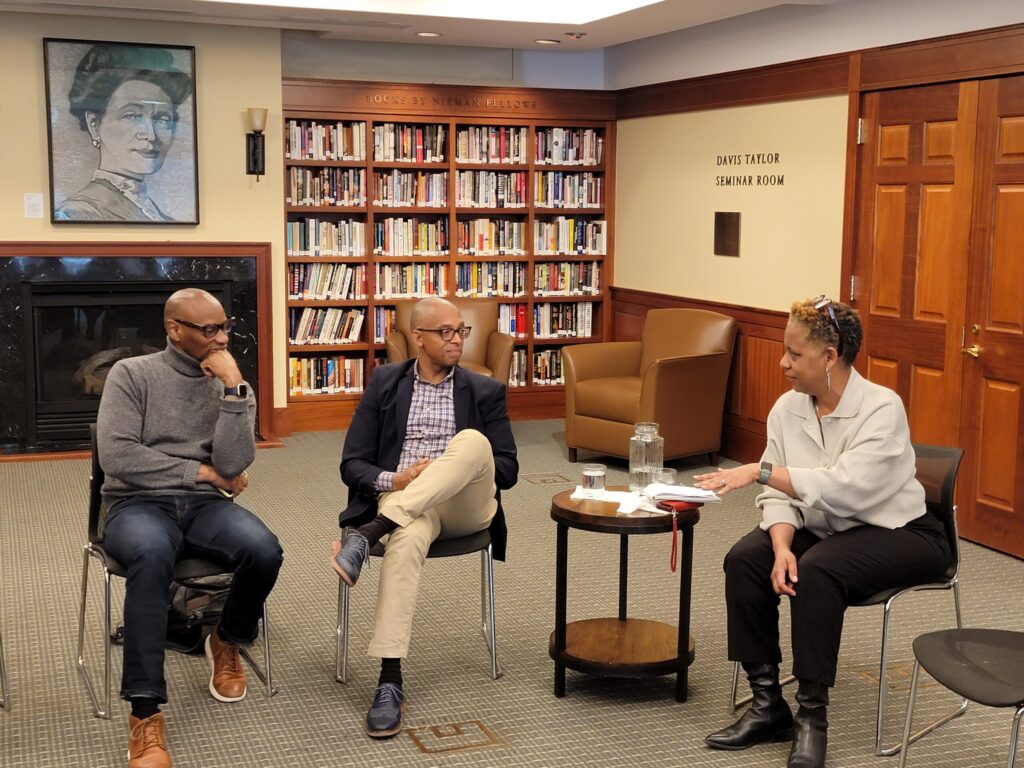
Khalil Gibran Muhammad, Ford Foundation Professor of History, Race and Public Policy at Harvard Kennedy School and the director of the Institutional Antiracism and Accountability Project, spoke with 2023 Niemans Darryl Fears and Deborah Berry, Washington, D.C.-based national correspondent for USA Today, about the push to ban AP African American history courses and related issues.
Berry also invited Erica Chenoweth, the Frank Stanton Professor of the First Amendment at Harvard Kennedy School and a Susan S. and Kenneth L. Wallach Professor at the Radcliffe Institute for Advanced Studies at Harvard, to speak with the Nieman Fellows about civil resistance around the world, political violence, authoritarianism and the media. Chenoweth directs the Nonviolent Action Lab.
Emily Goligoski, the head of research and senior vice president at Charter who previously worked at NYU’s Membership Puzzle Project and The Atlantic, joined Elisabeth Goodridge, deputy travel editor for The New York Times, and her 2023 Nieman classmates to talk about membership-based revenue models for journalism organizations and her work as a media researcher discovering insights on audience needs and wants around the world.
Moshe Halbertal, a professor of Jewish thought and philosophy at Hebrew University and New York University Law School, spoke with Nieman Fellow Romy Neumark, a senior anchor at Kan, the Israeli Public Broadcasting Corporation, about democracy and trust, including why trust in journalism and other fields has diminished, and what can be done to rebuild it.
William Overholt, a senior research fellow at the Ash Center for Democratic Governance and Innovation at Harvard Kennedy School, joined 2023 Nieman Fellow Natasha Kahn, Asia correspondent for The Wall Street Journal, to speak to the Nieman Fellows about issues related to China. Khan also invited Yasheng Huang, the International Program Professor in Chinese Economy and Business and a professor of global economics and management at MIT’s Sloan School of Management, to speak about China and its role in the world.
Other speakers hosted by Khan were Ronald Heifetz, founder of the Center for Public Leadership at Harvard Kennedy School, for a discussion about his work and findings, including his theory of adaptive leadership, especially as it pertains to journalists, and George Soroka, lecturer and assistant director of undergraduate studies in Harvard’s Department of Government, who spoke about his work and research, including his course Propaganda, Past and Present.
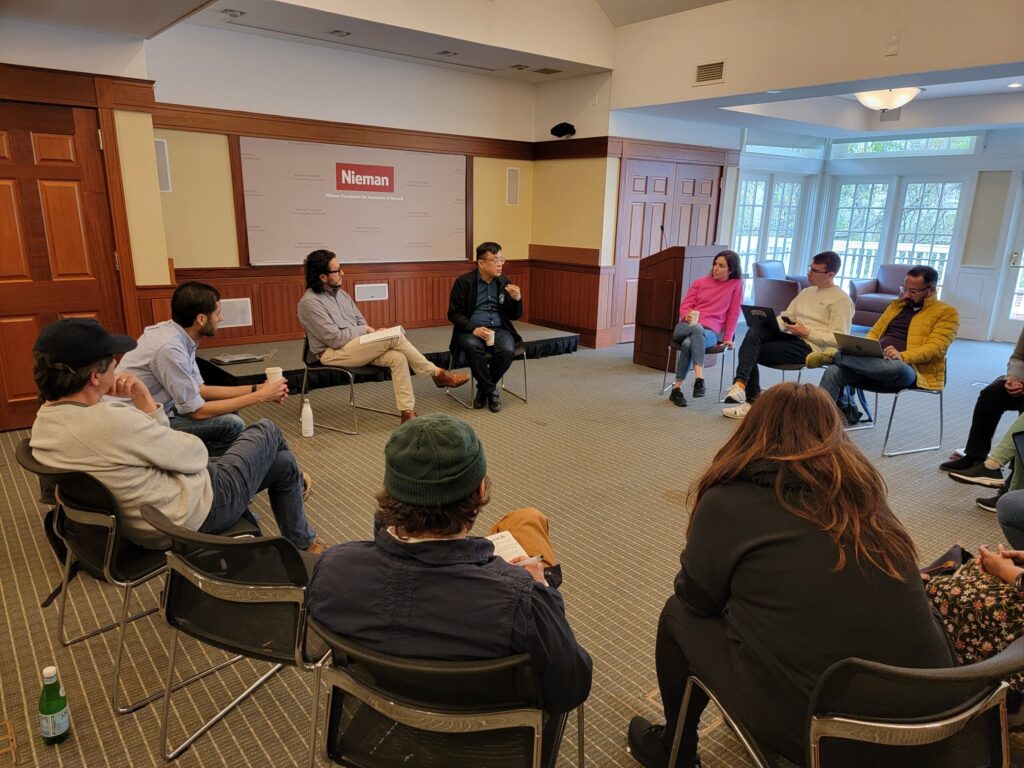
Sewell Chan, editor-in-chief of The Texas Tribune, spoke with 2023 Nieman Fellow Jorge Valencia, former Latin America correspondent for “The World,” about political news coverage in the U.S., diversity in newsrooms and alternative business models for news organizations. Earlier this year, Chan was chosen by his Harvard classmates to serve as the 2023 chief marshal of alumni on Alumni Day.
David McCraw, the top newsroom lawyer for The New York Times and lecturer on law at Harvard Law School, spoke with Nieman Fellow Ruth Tam, a podcast host and digital editor at WAMU, about his work. McGraw has been the principal legal advisor on almost all of the paper’s most important stories. His duties also include acting as the Times’s crisis response manager when journalists are kidnapped or detained overseas, and he has been actively involved in pro bono work in the area of press freedom and access to information.
Jonathan Martin, politics bureau chief and senior political columnist at Politico and a 2023 Institute of Politics fellow at Harvard spoke with Nieman Fellow James Barragán, a politics reporter for The Texas Tribune, about the current political climate in the United States ahead of the U.S. presidential race. He is the author of “This Will Not Pass: Trump, Biden, and the Battle for America’s Future.”
Ian Cross, host and producer of GBH’s nine-part podcast “The Big Dig,” visited Lippmann House to talk about his project and how to present such a complex, decades-long, public works story to a national audience,. His hosts were 2024 Nieman Fellow Andrew Ryan, an investigative reporter at The Boston Globe who, like Cross, covered the massive infrastructure project as it was happening, and 2024 Nieman Fellow Julia Barton, vice president and executive editor at Pushkin Industries, who played clips from the series and asked Cross about craft.
David Sanger, White House and national security correspondent for The New York Times and an adjunct lecturer in public policy at Harvard Kennedy School, joined Nieman Fellow Yana Lyushnevskaya, a senior journalist and deputy editor-in-chief in the Kyiv bureau of BBC Monitoring, for a discussion about covering international affairs, the view from Washington and the legacy of Henry Kissinger, among other topics.
Ethan Zuckerman, associate professor of public policy, communication and information at the University of Massachusetts at Amherst and founder of the Initiative for Digital Public Infrastructure spoke with host Denise Schrier Cetta, a producer and writer for “60 Minutes” at CBS News, and her Nieman classmates about his work researching the internet, social media and tech giants and how media can be used as a tool for social change.
Workshops, Trainings and Trips
Author Larry Tye, NF ’94, moderated a panel discussion about book publishing. Participants were Elizabeth Mendez Berry, vice president/executive editor at Penguin Random House’s One World Press; Bruce Nichols, senior vice president and publisher of Little, Brown and Company; and Susan Canavan an agent with the Waxman Literary Agency and a former senior executive editor at Houghton Mifflin Harcourt.
Nieman Advisory board member Jennifer 8. Lee, co-founder and CEO of Plympton and Writing Atlas, organized several sessions designed to help participants better understand generative AI and Chat GPT, including a workshop on how to build an AI bot.
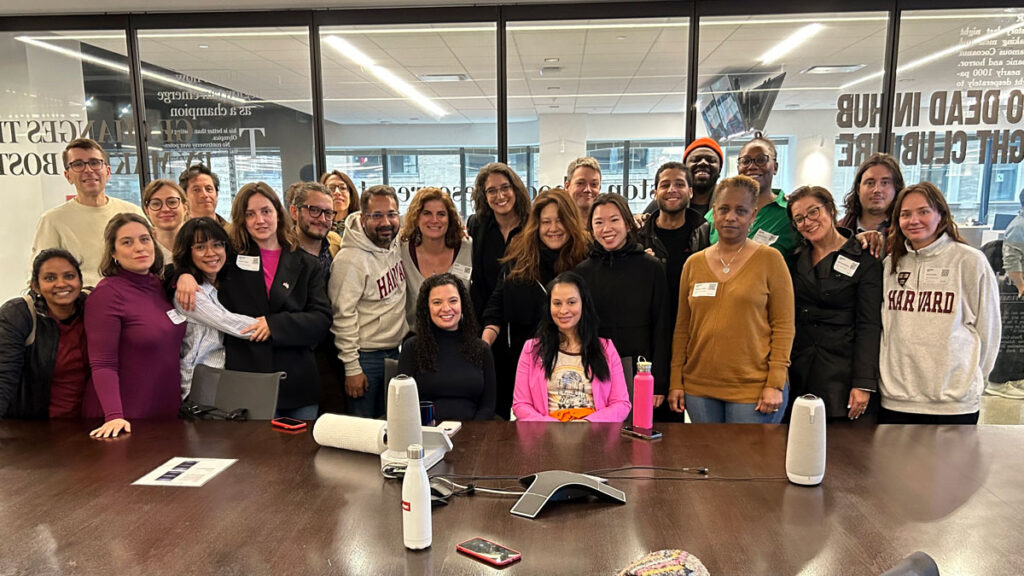
In May, the fellows toured The Boston Globe and heard about the newsroom’s outreach, DEI and editorial strategies from Nieman alumni Anica Butler, NF ’19, deputy managing editor for local news, Jeneé Osterheldt, NF ’17, senior assistant managing editor for culture, talent and development, and other colleagues, including Jason Tuohey, the Globe’s managing editor for digital.
Sheila Heen, the Thaddeus R. Beal Professor of Practice at Harvard Law School and deputy director of the Harvard Negotiation Project, led sessions for fellows in both the spring and fall semesters on ways for journalists to deal with challenging conversations and difficult negotiations.
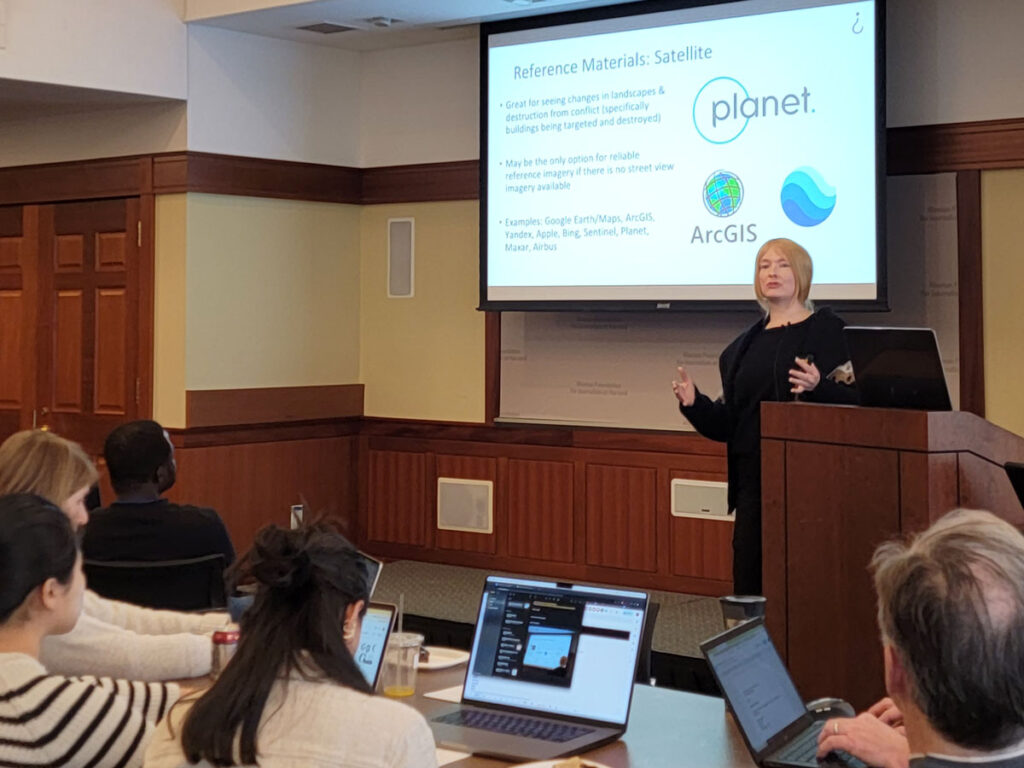
Michael Sheldon. a researcher for the investigative nonprofit Bellingcat, led a spring workshop for the 2023 Nieman Fellows on open-source research, geolocation, chronolocation, digital footprint research and satellite imagery analysis. In the fall, Johanna Wild, a 2024 Nieman Fellow and open-source researcher at Bellingcat, led a geolocation workshop using open-source tools for her Nieman classmates, MIT Knight Science Journalism Fellows and Berkman Klein Fellows.
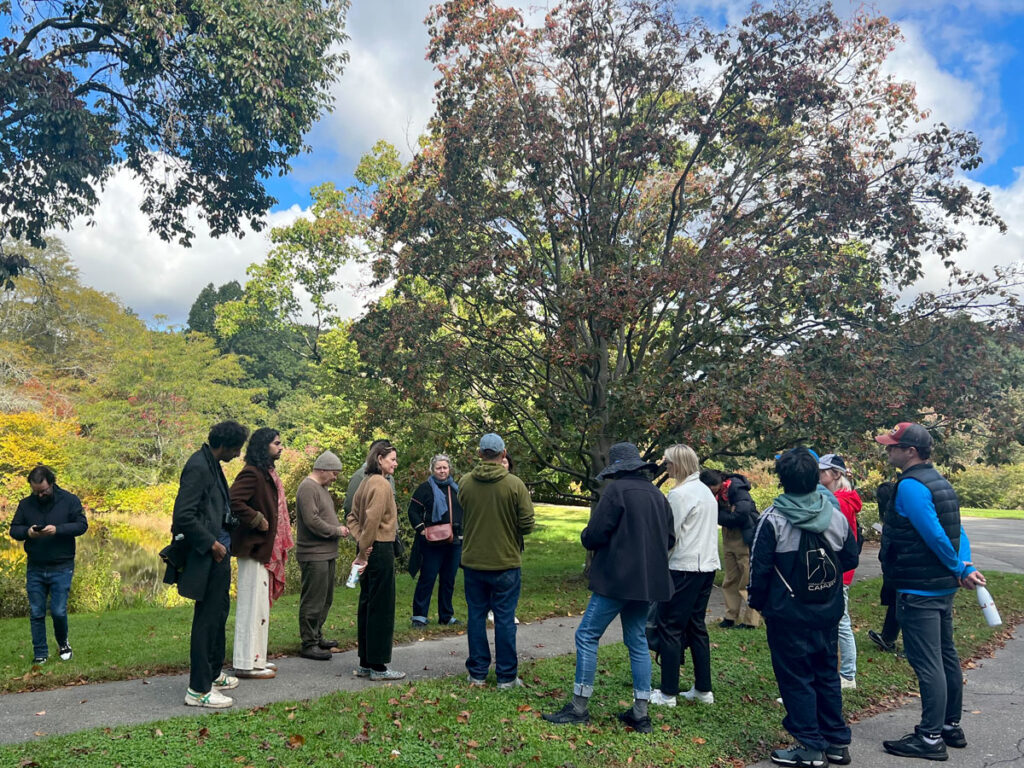
In October, Denise Hruby, a Vienna-based environment and investigative journalist who focuses on the climate and biodiversity crises, arranged a trip to Harvard’s Arnold Arboretum, a living museum of trees. She and her 2024 Nieman classmates toured the grounds and met with Arboretum director Ned Friedman who shared his insights about the Arboretum’s work.
Aimee Rinehart, the program manager for The Associated Press’s Local News AI initiative, along with Nieman’s audience engagement editor Adriana Lacy, ran a workshop on generative AI for journalists. They shared ways that newsrooms can take advantage of AI tools like ChatGPT and how AI can be used to complement, rather than threaten, good reporting.
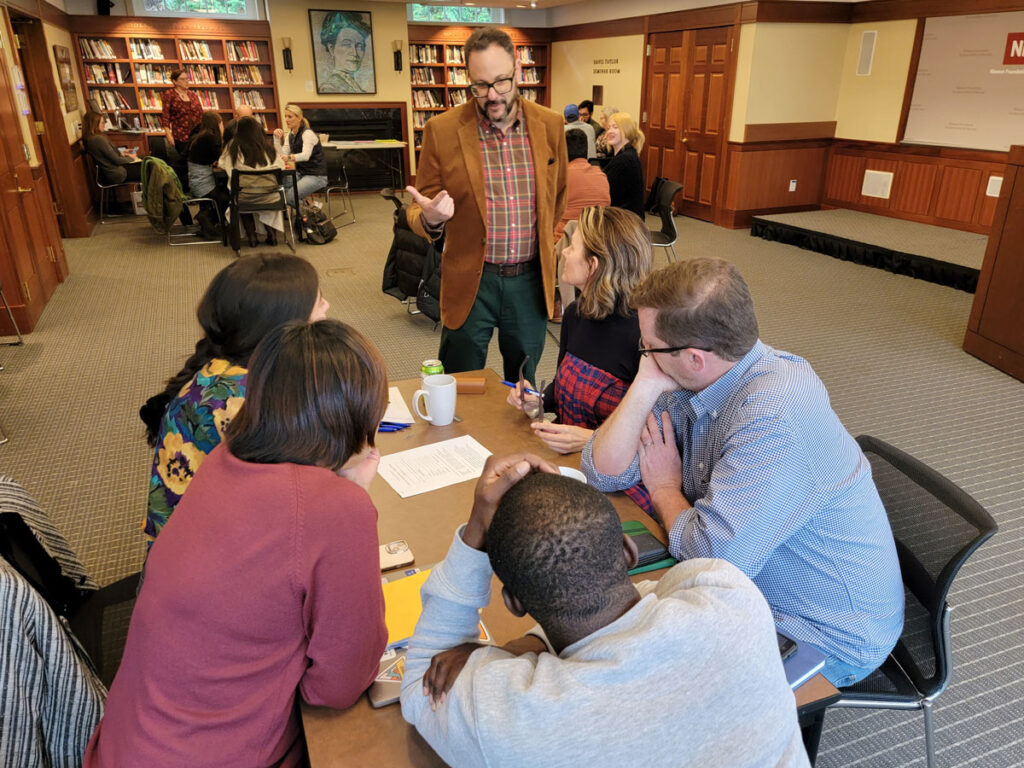
Christopher Robichaud, a senior lecturer in ethics and public policy at Harvard Kennedy School, led the 2024 Nieman Fellows in his popular Zombie Apocalypse simulation, designed to help professionals explore ethical decision making in the context of practicing leadership skills and negotiation.
Brian Mandell, director of the Negotiation and Conflict Resolution Collaboratory at Harvard Kennedy School, taught an intensive one-day negotiation workshop in November.
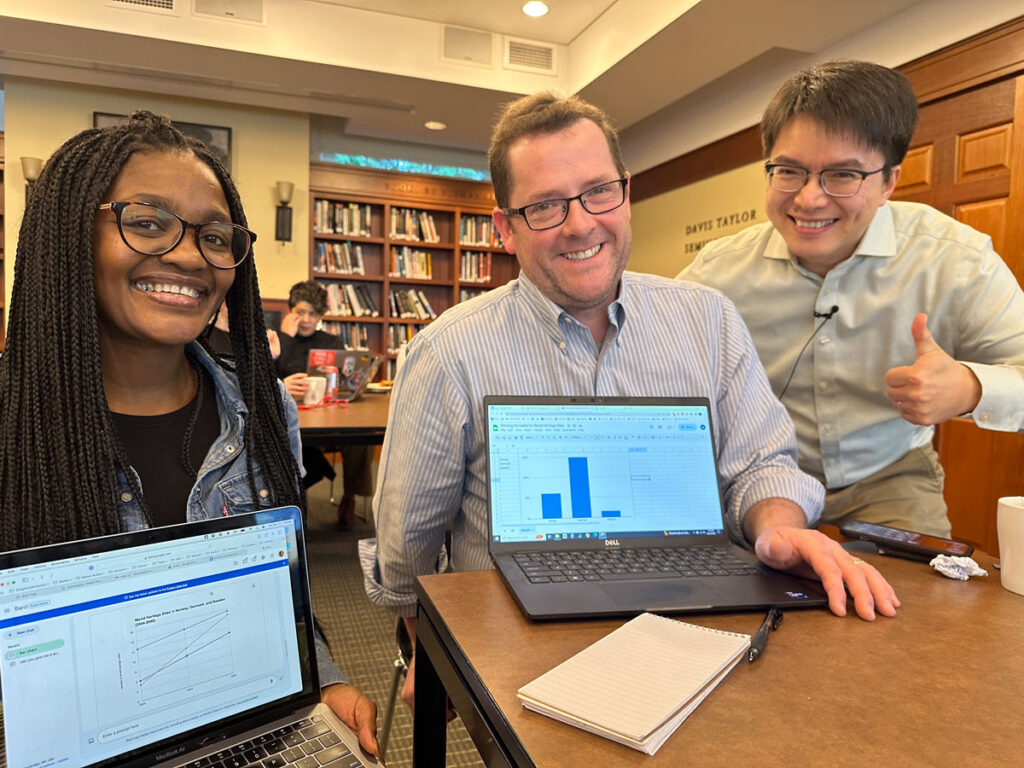
Hong Qu, an adjunct lecturer and research fellow at the Malcolm Wiener Center at Harvard Kennedy School and a 2013 Visiting Nieman Fellow, led a training session on data visualization, ChatGPT, AI and other tools as they relate to journalism.
In December, the 2024 fellows visited the MIT Media Lab, where they heard from professor of media technology Pattie Maes and her team in the Fluid Interfaces lab, as well as Deb Roy, professor of media arts and sciences and director of the Center for Constructive Communication.
